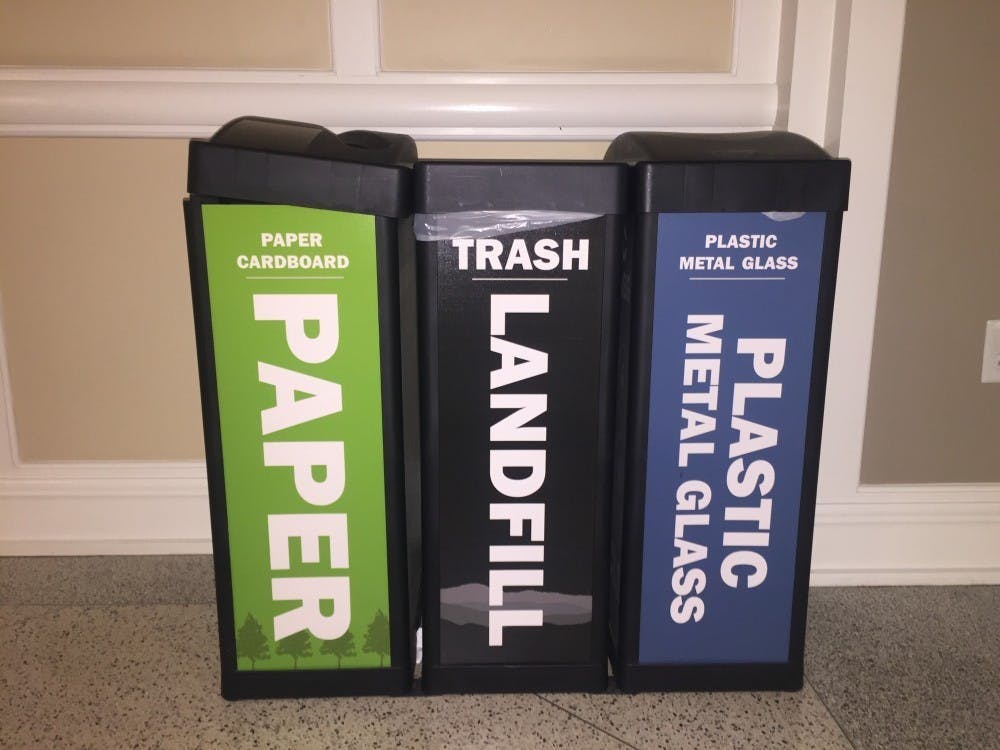Following a Board of Visitors meeting in September about sustainability and infrastructure around Grounds, The Cavalier Daily reported that the University is nearly six years ahead of schedule in its initial plan to reduce greenhouse gas emissions by 25 percent. Coupled with U.Va. diverting “6,500 tons from landfills by recycling 44 percent of its waste,” it appears as if the University is a poster child for sustainability. But, after digging further into the fate of these recycled materials after they leave Grounds, it is questionable whether the University is actually reducing its carbon footprint to the extent that they claim.
The University’s website offers a short, undetailed description of the recycling services they offer. This list simply outlines what can and cannot be tossed into the recycling bins, including various metals, cardboard, glass of all colors, paper products, electronics and plastics #1-7. However, this exhaustive list is actually quite deceptive. The reality is that most plastic cannot be recycled, meaning even if plastic is tossed in the bin, it may still end up in the landfill.
Some waste management companies blame this on consumers, calling them “bad recyclers” for being unaware of what can and cannot be recycled. Yet, most facilities only recycle certain types of plastics because some small or flimsy items, such as plastic grocery bags, cause machine malfunctions that shut down the system completely.
Recent geo-political developments have further compromised the global market for plastics. China’s decision to ban imports of “dirty foreign garbage” shocked the United States recycling system, since the country previously processed the majority of our recycled waste. This led to what many believed to be the “death of recycling,” given that U.S. companies cannot presently handle the excess supply as effectively.
Despite these setbacks, the University remains adamant that it will continue to accept and recycle all plastics. In fact, in its contract with Sonoco — the company responsible for processing all of our recycling — the University requires each item actually be recycled instead of being tossed into a landfill following pick-up. However, Phil McKalips, director of the Rivanna Solid Waste Authority, reported speaking with a manager at Sonoco and was told that “the 3-7 plastics were just landfilled.” This in particular reveals how flawed our recycling system is, given major organizations advertise intensive recycling programs that appear to fall short and send large quantities of plastic to landfills or incinerators.
Given the many flaws in the U.S. recycling process, the University should attempt to reduce its carbon footprint in other ways, starting with a re-evaluation of its energy sources. With 27 percent of its heat coming from coal, the University has been labeled by Facilities Management as “a major source of hazardous air pollutants.” This not only poses significant dangers to human health, it also is a considerable obstacle for the University to realize its goal of being truly sustainable.
While the University is reporting meaningful reductions to its carbon footprint, the lack of transparency regarding where our plastic actually ends up calls this so-called sustainability into question. The University must both hold Sonoco accountable for what it is doing with our recycled materials and continue to implement further changes to reduce our environmental impact. This crusade to combat climate change can’t be successful if it’s all for show.
The Cavalier Daily Editorial Board is composed of the Executive Editor, the Editor-in-Chief, the two Opinion Editors and their Senior Associate. The board can be reached at eb@cavalierdaily.com.







